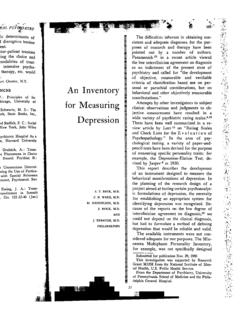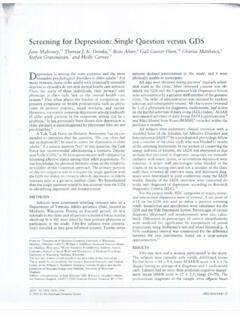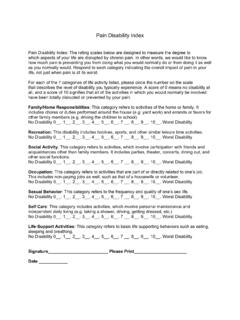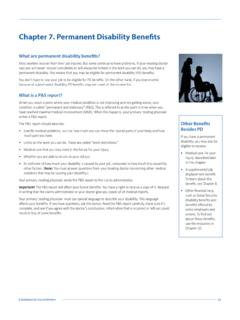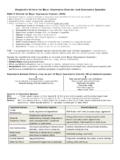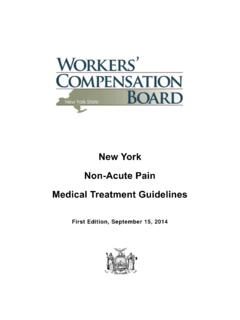Transcription of Cornell Scale Guidelines
1 The Cornell Scale for Depression in Dementia ADMINISTRATION & SCORING Guidelines George S. Alexopoulos, Cornell Institute of Geriatric Psychiatry Weill Medical College of Cornell University 21 Bloomingdale Road White Plains, NY 10605 CSDD 12/02/02 Page 1 The Cornell Scale for Depression in Dementia Administration & Scoring The Cornell Scale for Depression in Dementia (CSDD) was specifically developed to assess signs and symptoms of major depression in patients with dementia. Because some of these patients may give unreliable reports, the CSDD uses a comprehensive interviewing approach that derives information from the patient and the informant. Information is elicited through two semi-structured interviews; an interview with an informant and an interview with the patient.
2 Based on these interviews, the interviewer can score the CSDD by assigning a preliminary score to each item of the Scale on the basis of the informant s report in the Informant column. The next step is for the rater to interview the patient using the Cornell Scale items as a guide. The interviews focus on depressive symptoms and signs occurring during the week preceding the interview. Many of the items during the patient interview can be filled after direct observation of the patient. If there are discrepancies in ratings generated from the informant and the patient interviews, the rater should re-interview both the informant and the patient to resolve the discrepancies. The final ratings of the CSDD items represent the rater's clinical impression rather than the responses of the informant or the patient.
3 The CSDD takes approximately 20 minutes to administer. Each item is rated for severity on a Scale of 0-2 (0=absent, 1=mild or intermittent, 2=severe). The item scores are added. Scores above 10 indicate a probable major depression. Scores above 18 indicate a definite major depression. Scores below 6 as a rule are associated with absence of significant depressive symptoms. INTERVIEW WITH THE INFORMANT Who qualifies as an Informant? Informants should know and have frequent contact with the patient. Reliable informants can include nursing staff for patients in the hospital and nursing homes or a family member for outpatients. The informant interview should be conducted first. The interviewer should ask about any change in symptoms of depression over the prior week.
4 The rater should complete each item on the Scale . The rater can expand on the descriptions of the symptoms in order to help the informant understand each item. Interview Instructions: I am going to ask you questions about how your relative has been feeling during the past week. I am interested in changes you have noticed and the duration of these changes. CSDD 12/02/02 Page 2 A. Mood Related Signs 1. Anxiety: (anxious expression, ruminations, worrying) Has your relative been feeling anxious this past week? Has s/he been worrying about things s/he may not ordinarily worry about, or ruminating over things that may not be that important? Has your relative had an anxious, tense, distressed or apprehensive expression?
5 2. Sadness: (sad expression, sad voice, tearfulness) Has your relative been feeling down, sad, or blue this past week? Has s/he been crying at all? How many days out of the past week has s/he been feeling like this? For how long each day? 3. Lack of reactivity to pleasant events: If a pleasant event were to occur today ( , going out with spouse, friends, seeing grandchildren), would your relative be able to enjoy it fully, or might his/her mood get in the way of his/her interest in the event or activity? Does your relative s mood affect any of the following: his/her ability to enjoy activities that used to give him/her pleasure? his/her surroundings? his/her feelings for family and friends?
6 4. Irritability: (easily annoyed, short tempered) Has your relative felt short-tempered or easily annoyed this past week? Has s/he been feeling irritable, impatient, or angry this week? B. Behavioral Disturbance 5. Agitation: (restlessness, handwringing, hairpulling) Has your relative been so fidgety or restless this past week that s/he was unable to sit still for at least an hour? Was your relative so physically agitated that you or others noticed it? Agitation may include such behaviors as playing with one s hands, hair, hand-wringing, hair-pulling, and/or lip-biting: have you observed any such behavior in your relative during the past week? 6. Retardation: (slow movements, slow speech, slow reactions) Has your relative been talking or moving more slowly than is normal for him/her?
7 This may include: slowness of thoughts and speech delayed response to your questions decreased motor activity and/or reactions. 7. Multiple physical complaints: In the past week, has your relative had any of the following physical symptoms? (in excess of what is normal for him/her): indigestion? constipation? diarrhea? stomach cramps? belching? joint pain? backaches? muscles aches? frequent urination? sweating? headaches? heart palpitations? hyperventilation (shortness of breath)? CSDD 12/02/02 Page 3 If you have observed any of these physical symptoms, how much have these things been bothering your relative? How severe have the symptoms gotten? How often have they occurred in the past week?
8 Rating guideline: Do not rate symptoms that are side effects from medications or those symptoms that are only related to gastrointestinal ailments. 8. Acute Loss of interest: (less involved in usual activities) How has your relative been spending his/her time this past week (not including work and chores)? Has your relative felt interested in his/her usual activities and hobbies? Has your relative spent any less time engaging in these activities? If s/he is not as interested, or has not been that engaged in activities during the past week: Has your relative had to push him/herself to do the things s/he normally enjoys? Has your relative stopped doing anything s/he used to do? Can s/he look forward to anything or has s/he lost interest in many of the hobbies from which s/he used to derive pleasure?
9 Rating guideline: ratings of this item should be based on loss of interest during the past week. This item should be rated 0 if the loss of interest is long-standing (longer than 1 month) and there has been no worsening during the past month. This item should be rated 0 if the patient has not been engaged in activities because of physical illness or disability , or if the patient has persistent apathy associated with dementia. C. Physical Signs 9. Appetite loss: (eating less than usual) How has your relative s appetite been this past week compared to normal? Has it decreased at all? Has your relative felt less hungry or had to remind him/herself to eat? Have others had to urge or force him/her to eat? Rating guideline: Rate 1 if there is appetite loss but still s/he is eating on his/her own.
10 Rate 2 if eats only with others encouragement or urging. 10. Weight loss: Has your relative lost any weight in the past month that s/he has not meant to or been trying to lose? (If not sure: are your relative s clothes any looser on him/her?) If weight loss is associated with present illness ( , not due to diet or exercise): how many pounds has s/he lost? Rating guideline: Rate 2 if weight loss is greater than 5 lbs. in past month. 11. Lack of energy: (fatigues easily, unable to sustain activities score only if change occurred acutely, or in less than one month) How has your relative s energy been this past week compared to normal? Has s/he been tired all the time? Has s/he asked to take naps because of fatigue?






